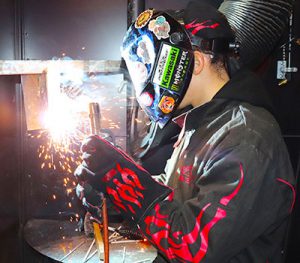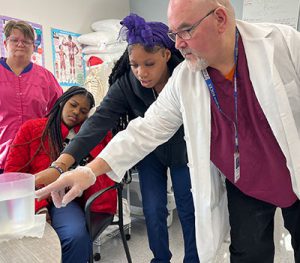Fired up about welding
Watervliet High School senior Karlton Canty is pursuing training in Welding and Metal Fabrication program at Capital Region BOCES because the skills are “in demand.”

“This is a job that is in high demand and I find it satisfying,” he said.
According to data from the U.S. Bureau of Labor Statistics, on average 42,600 openings are projected each year over the next decade in the welding field. The shortage of skilled workers is boosting salaries for those willing to do the work and who have the right training — like that offered through the Capital Region BOCES Career and Technical Education Center.
Earlier this year during a speech to aspiring welders in the BOCES CTE program, American Welding Society President Mike Krupnicki underscored those facts.
“You can earn a lot of money and have a nice lifestyle. Every state in the union needs welders,” he said.
Karlton is among approximately five dozen students enrolled in the Capital Region BOCES welding program this school year. Students in the two-year program learn American Welding Society standards and earn certifications that prepare them for a career in the welding industry.
“I like being able to make things with metal at BOCES and prepare for a good future,” he said.
Learn more about the Capital Region BOCES Welding and Metal Fabrication program
A healthy career choice

An interest in helping others prompted Watervliet High School junior Talisia Johnson-Taylor to enter the Two-Year Sequence of Health Careers program at the Capital Region BOCES CTE in Albany — and follow a career path that several of her family members have chosen.
“I like to help and take care of people. My grandmother was a CNA and my mother was a CNA and my cousins are currently working in healthcare, so this is the right career for me,” said Johnson-Taylor.
This school year, a total of 84 students are enrolled in the Two-Year Sequence of Health Careers program on the Albany and Schoharie campuses.
Students in the program learn the skills necessary to earn certification as a Home Health Aide (HHA) and Personal Care Aide (PCA) and Nurse Assistant (NA) and prepare for further studies and advancement in the healthcare field.
“I like that we get to learn different important skills and that we are learning in a physical setting, not just sitting in class,” Talisia said.
Learn more about the Two-Year Sequence of Health Careers program


